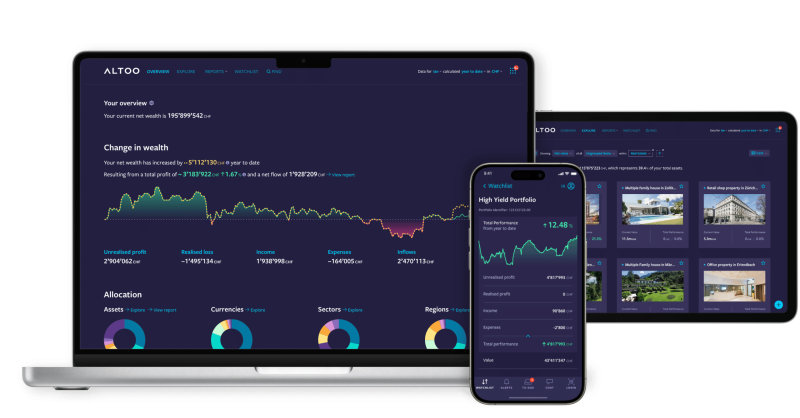The Altoo Wealth Management Platform guarantees its professional clients excellent assistance and professional management of their assets at all times.
Our well acclaimed digital software provides its users with modern access and data to better understand their wealth and safeguard it.
The Altoo Wealth Platform not only enhances convenience for all parties involved but also offers a more comprehensive view of the accumulated wealth.
Institutions like Private Banks and Independent Asset Managers may attract a new generation of investors by enhancing convenience for all parties involved and offering a more comprehensive view of the accumulated wealth of their clients.

Private Bankers and Independent Asset Managers have access to a robust resource with all the bells and whistles necessary to maintain their current level of success. The foundation for this is the adoption of digital wealth data consolidation and management. This strategy frees up resources and helps wealth management entities make informed financial decisions by leveraging real-time reporting. All of this is made possible within a secure communication network, bolstered by investment monitoring alerts.

The field of wealth management is currently undergoing notable transformations. Private Banks that demonstrate a willingness to question the existing norms and explore innovative approaches are more likely to achieve success.
The Private Banking Industry may be facing some challenges in terms of profitability. It has made significant efforts to address the challenges impacting profitability in recent years. The overall trend, however, indicated a decrease in operational efficiency and profitability due to declining revenues surpassing the decrease in expenses.
Additionally, it is worth noting that the reported strong growth in assets under management by individual banks can largely be attributed to their acquisition operations.
In light of the current circumstances, what measures can be taken to ensure sustainable growth?
There are individuals who hold an optimistic view that Switzerland’s financial hub benefits from its strategic location and the extensive expertise of its institutions, which they believe could potentially contribute to maintaining a competitive advantage in the global marketplace.
According to their perspective, it may not be necessary to make extensive changes to established commercial practices. Instead, it would be beneficial to support legislation that promotes healthy competition and encourages free markets, all while embracing the opportunities presented by digitalization. Some experts have suggested that there may be a resurgence in traditional Swiss Banking.
There are also others who hold the belief that digital asset management has great potential for the future. It has been suggested that there is a possibility of computers with the ability to learn, reason, and engage in natural conversations potentially replacing human workforce.
Additionally, client service may be offered as a premium more personalised option. There are notable similarities between the two industries, the automobile and the banking one. It is widely believed that the internal combustion engine may face some challenges in the future, as there is growing interest in electric propulsion for the next generation of vehicles.
However, it may take a considerable amount of time before Private Banks fully transition away from traditional “combustion engines” and prioritise Digital Wealth Management.
To successfully navigate this period of transition, it is advisable for each bank to introspect, critically evaluate established practices, and consider embracing new ideas that may involve taking calculated risks. Due to the potential challenges involved, implementing the required modifications may present certain complexities. The era in which revenue effortlessly flowed in has become a thing of the past.
One suitable solution might be utilising a Digital Wealth Management Software. Through a protected client management interface, Wealth Management products streamline and simplify the complicated financial activities of high-net-worth clients.
Digital Wealth Software Solutions help wealth managers and private banks handle their customers’ investments, loans, and other financial assets.

Their common features include:
After the fall of the Berlin Wall in November 1989, conventional political thinking both inside and outside of Europe had to be rethought. In 2010 and 2023, both Swiss banks and the Swiss Financial Center were in the same position.
The subprime crisis, recession, surprising bank mergers or affluent clients from countries with differing political systems have had negative effects on the banking industry for over a decade.
Confidentiality agreements between banks and their customers have been under assault since the 2008 financial crisis. On the bright side, this may force private banks to evaluate and improve their business models, making them more competitive.
In a world where globalisation, modern means of communication, and tools used to monitor citizens are proliferating and threatening the fundamental rights of individuals, the attacks on bank-client confidentiality remind us of the importance of protecting privacy.
The danger of being cut off from the rest of the world is a problem for Switzerland’s financial hub. Only by making their goods and services available internationally will Swiss banks and asset managers be able to attract customers from abroad. Therefore, the country needs to keep an eye out for any signs of protectionism in the international markets, whether they include the European Union, the United States, or anywhere else. This trend is most prominent in Europe, where the European Union is erecting additional hurdles for foreign market players, such as those working in alternative asset management.
Experts worry that Swiss banks and asset managers will move high-value employment abroad if the country is unable to continue exporting its expertise. Why should we tolerate the fact that any bank in Europe, the United States, and the rest of the globe may provide its services in Switzerland yet we cannot enter those countries’ financial markets? The opening of more locations is one answer, as is shifting to a distribution-based business strategy.


Private banks in Switzerland are currently facing some challenges related to their earnings and cash flow. Their return on equity may not be sufficient to fully cover their cost of capital. Some private banks in Switzerland may be facing challenges that they may not openly acknowledge. Based on an evaluation conducted by the auditing and consulting firm KPMG, it has been observed that several institutions are currently facing challenges related to their earnings and, more recently, experiencing outflows of funds in the traditional cross-border asset management business.
One aspect that suggests a decline in operating results is the cost-income ratio, which has experienced a significant increase over the past couple of years, reaching a notable 84%. In the past business year, the private banks incurred costs amounting to 84 centimes for every franc earned.
In contrast, at a well-managed cantonal or regional bank, a significant portion of every franc earned is allocated towards costs. One of the factors contributing to the challenges in maintaining operational resilience is the consistent decrease in income over the years, which has proven difficult to offset through cost-saving measures. Alternatively, it can be stated that there is a discrepancy between declining earnings and costs.
This is particularly noteworthy, considering that a significant portion of the costs can be attributed to personnel expenses, including wages. Smaller institutions may face challenges or have different priorities when it comes to making significant adjustments to the salaries of their staff.
The industry is currently experiencing some challenges, which have resulted in a relatively low return on equity of 4 to 6% across the board. This may not fully align with the estimated cost of capital ranging from 7 to 10%. Additionally, it is worth considering that private banks may have different approaches to value creation.
Equally concerning is the observation that last year, there was a notable outflow of net assets, which is a departure from recent trends. In certain cases, medium-sized banks have made the decision to discontinue their operations in certain markets due to challenges in achieving long-term profitability with their current asset levels.




The issue of professional qualifications in Private Banking is more than just a matter of individual aptitude; it also serves as an assurance of quality and ethical standards for clients. Inadequate qualifications can lead to ineffective Wealth Management, putting both clients and banking institutions at risk.
The role of a Private banks also demands practical experience in managing complex financial portfolios. Lack of experience can manifest in many ways, from poor decision-making to ineffective client communication, all of which can compromise the financial well-being of the client and the reputation of the banking institution.
Private Bankers and Independent Asset Managers are key stakeholders in the realm of Wealth Management. Each plays a distinct yet inter-connected role in guiding individuals and organisations towards their financial goals.

Here are the names of five leading international banks known for their Private Banking services:
Here are the names of five leading global firms known for their robust independent asset management services:
A Private Bank is a financial institution that offers personalised financial services and investment advice to high-net-worth individuals and families. The goal is to help clients manage, grow, and protect their wealth through a variety of tailored banking and investment services.
Private Banks offer a wide range of personalised financial services to high-net-worth individuals and families. These services can include investment management, estate planning, tax advice, and personalised lending solutions. The goal is to create and implement a comprehensive financial strategy that aligns with the client’s financial goals and risk tolerance.
Independent Asset Managers (IAMs) are financial professionals who operate independently of any bank or financial institution. They offer tailored investment advice and Wealth Management services to high-net-worth clients, providing unbiased and conflict-free guidance.
IAMs offer a range of key services, including portfolio management, risk assessment, strategic asset allocation, estate planning, and tax optimisation. Their focus is on delivering personalised financial strategies based on the client’s unique needs and objectives.
Yes, The Altoo Wealth Management Platform provides tools for Private Banks, assisting them in offering enhanced Wealth Management solutions and a streamlined experience to their clients. The platform is designed to cater to the specific needs of Private Banks, ensuring efficient, secure, and user-friendly Wealth Management processes.
Wealth Management is a comprehensive approach to optimising a client’s financial portfolio. It involves evaluating risk tolerance and aligning investment strategies to meet specific plans and objectives. Although Wealth Management can be applied to financial portfolios of any size, it is particularly focused on serving affluent individuals.
On the other hand, Private Banking is a specialised service offered by financial institutions, specifically targeted at high-net-worth individuals (HNWIs). In Private Banking, dedicated staff provide personalised financial services and management, including but not limited to, investment advice, estate planning, and tax optimisation.
In essence, while both aim to manage and grow a client’s wealth, Private Banking offers a more exclusive, tailor-made service, typically for those with significant financial resources. Wealth Management, however, is a broader field that can be applied across various levels of income and asset sizes.
The eligibility criteria for Private Banking can differ among financial institutions, but a common starting point is often investable assets of at least $1 million. Some Private Banks may have even higher minimum requirements, such as $5 million or $10 million in investable assets, to be considered for an account.